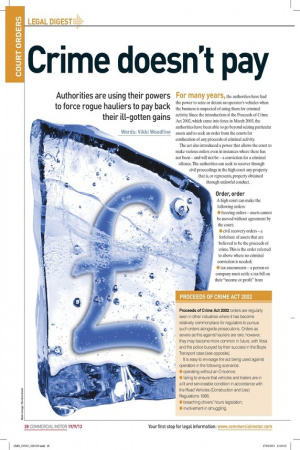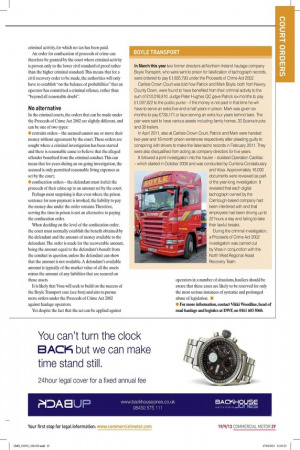Crime doesn't pay
Page 21

Page 22

If you've noticed an error in this article please click here to report it so we can fix it.
Authorities are using their powers to force rogue hauliers to pay back their ill-gotten gains im"rdS: Vikki Woodfine
For many years, the authorities have had the power to seize or detain an operator's vehicles when the business is suspected of using them for criminal activity. Since the introduction of the Proceeds of Crime Act 2002, which came into force in March 2003, the authorities have been able to go beyond seizing particular assets and to seek an order from the courts for confiscation of any proceeds of criminal activity. The act also introduced a power that allows the court to make various orders even in instances where there has not been — and will not be — a conviction for a criminal offence. The authorities can seek to recover through civil proceedings in the high court any property that is, or represents, property obtained
through unlawful conduct.
Order, order
A high court can make the following orders: • freezing orders — assets cannot be moved without agreement by the court; • civil recovery orders — a forfeiture of assets that are believed to be the proceeds of crime. This is the order referred to above where no criminal conviction is needed; • tax assessments — a person or company must settle a tax bill on their "income or profit" from
criminal activity, for which no tax has been paid.
An order for confiscation of proceeds of crime can therefore be granted by the court where criminal activity is proven only to the lower civil standard of proof rather than the higher criminal standard. This means that for a civil recovery order to be made, the authorities will only have to establish "on the balance of probabilities" that an operator has committed a criminal offence, rather than "beyond all reasonable doubt".
No alternative
In the criminal courts, the orders that can be made under the Proceeds of Crime Act 2002 are slightly different, and can be one of two types: • restraint orders – the accused cannot use or move their money without agreement by the court. These orders are sought where a criminal investigation has been started and there is reasonable cause to believe that the alleged offender benefited from the criminal conduct. This can mean that for years during an on-going investigation, the accused is only permitted reasonable living expenses as set by the court;
• confiscation orders – the defendant must forfeit the proceeds of their crime up to an amount set by the court.
Perhaps most surprising is that even where the prison sentence for non-payment is invoked, the liability to pay the money due under the order remains. Therefore, serving the time in prison is not an alternative to paying the confiscation order.
When deciding on the level of the confiscation order, the court must normally establish the benefit obtained by the defendant and the amount of money available to the defendant. The order is made for the recoverable amount, being the amount equal to the defendant's benefit from the conduct in question, unless the defendant can show that the amount is not available. A defendant's available amount is typically of the market value of all the assets minus the amount of any liabilities that are secured on those assets.
It is likely that Vosa will seek to build on the success of the Boyle Transport case (see box) and aim to pursue more orders under the Proceeds of Crime Act 2002 against haulage operators. Yet despite the fact that the act can be applied against







































